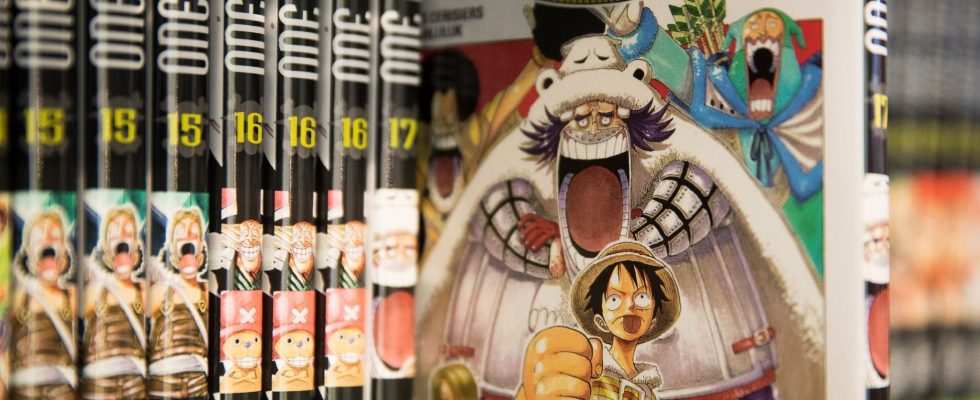Crisis ? What crisis? As the Angoulême festival begins, the manga market is still in strong health. Certainly, in 2023, sales fell by 13% in value. But this correction, which was anticipated, comes after three exceptional years during which the French reduced certain expenses (travel, cinema, restaurants, etc.) in favor of video games and reading. Despite this landing, the size of the manga market remains twice as big as before Covid, underline the publishers who are doing everything they can to make us forget the ambient gloom. Their strategy? Let go of the fighting and violence a little in favor of more adult and reassuring stories. Welcome to the era of “feel good” manga.
At Glénat, the reader surveys are clear. The time is no longer really for horror stories but for comfort and slices of life. How to find love again after 60? How to accept yourself and face the eyes of others? Does boy-girl friendship exist? In The Flaming Souls, readers are offered eight stories that are far removed from the usual sword mangas. “This type of work is of great interest to readers,” says Satoko Inaba, editorial director at Glénat Manga. To continue its momentum, the publisher is therefore preparing for next spring the release of Finally become myselfan autobiographical essay retracing the journey of its author Yuna Hirasawa, suffering from gender identity disorder.
“With the post #MeToo generation, readers are increasingly interested in manga addressing issues of emancipation,” notes Stéphane Duval, founder and director of the publishing house Le Lézard Noir. After experiencing enormous success with The Midnight Canteena succession of short stories taking place in a Japanese restaurant open at night (13 episodes published in France and 200,000 copies sold), the Poitevin publisher is now banking on The bike store salesman, the story of a young temporary employee who, at a given moment, decides to assert herself in life and say no. “As in The Midnight Canteen, we quickly become attached to the characters. There is a romance part but the work is also a critique of the world of work with its conflicting hierarchical relationships and its cases of sexual harassment,” specifies Stéphane Duval.
Ahmed Agne, editorial director at Ki Oon, confirms this shift towards more societal subjects. “In 2023, we launched From the movement of the Earth, a manga dealing with heliocentrism, a model placing the sun at the center of the Universe and our solar system. The story takes place in Europe in the 15th century. Astronomers try to challenge religious dogma to move the lines and establish scientific fact. A fight that resonates with current events as rationality is under attack today. “All these titles would not have seen the light of day without a profound evolution in the readership. For a long time, it focused on adolescent themes. Now, it is moving on to something else, opening up to more diversity,” emphasizes Alex , bookseller at AAApoum Bapoum in the 6th arrondissement in Paris.
Publishers adapt their catalog
“Readers who discovered Dragon Ball And Akira thirty years ago continue to read manga except that they are over 40 now. This form of comic strip still interests them, but they want to discover something other than fights with fireballs”, confirms Ahmed Agne. The publishers are therefore adapting their catalog. With Frieren, adapted into French by Ki-Oon, Yamada Kanehito completely revisits the world of fantasy. The main character – a century-old Efle – does not go into battle but enjoys the simple pleasures of life after becoming aware of the ravages of time.
Publishers also take advantage of this to reissue works that have been neglected for a long time. “As for cat mangas – with timeless success – or webtoons, these mangas on smartphones whose big hits are now published in paper form, everyone is getting into it,” explains Axel the bookseller. Thus, Glénat is reissuing in two anthologies the works of Moto Hagio, one of the distinguished guests of the Angoulême festival. “There is a wait among readers. Either we no longer found these titles in France, or they had never been published,” specifies Satoko Inaba, who measures the progress made in ten years. “In 2013, we had already published works by Moto Hagio, but this did not lead to big sales. Today, in the press or on social networks, the reception given to these titles is completely different. Much of people saying they are interested.
Although modern, the themes covered deviate, once again, from the usual standards. In one of the two collections, for example, it is a question of mental load. In the other, a short story talks about gender “fluidity”: a character can choose to become a man or a woman when transitioning to adulthood. “Ten years ago, the French market was not ready to welcome these pioneering stories dating from the 1970s or 80s,” notes Satoko Inaba. This is no longer the case today. Rather delightful, no?
.
